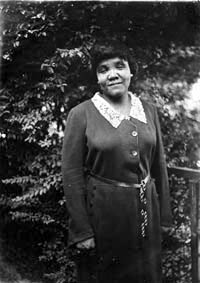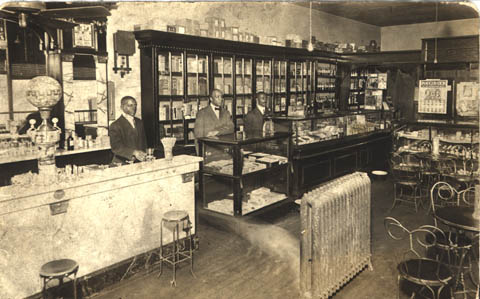Featuring local speakers who will share their knowledge and experience. All public housing residents are welcome.
Hillcrest’s Carl E. Johnson Community Center
Every Saturday in February: 1, 8, 15, 22. 9am
9am -11am

Featuring local speakers who will share their knowledge and experience. All public housing residents are welcome.
Hillcrest’s Carl E. Johnson Community Center
Every Saturday in February: 1, 8, 15, 22. 9am
9am -11am

Heritage of Black Highlanders
UNC Asheville Ramsey Library
Maggie Jones: bhcP77.10.4.2.21.1
Mary Maggie Foster was born November 19, 1877 in Jonesville, South Carolina, the second of three children born to Edmond and Lucinda (Brown) Foster.1
She was married in Buncombe County in 1897 to William Davis,2 and is listed in the 1900 census as a dressmaker, living with her mother on Grove Street.3 Her marriage was short-lived, however, and by 1905 she was married to Dr. Henry Edward Jones,4 of Aldrich, Alabama, the son of George & Lora (King) Jones.5 The 1910 census shows them living on Knob St., Henry working as a pharmacist and Maggie as a seamstress.6 Maggie Jones is listed on the website of the Heritage of Black Highlanders Collection and remembered as a pioneer in work among black women.
A great organizer of clubs for community improvement. Organized first Asheville branch of NC Federation of Negro Women’s Clubs and was a charter member of the state organization. She was a great community worker for the uplift of black women. Her husband, a pharmacist working in the early 1920’s, was one of the first black doctors to practice here.
She organized the Girl’s Industrial Club whose aim was to develop Christian leadership and skilled employment. The club later became part of the Phyllis Wheatley Branch of the YWCA.
She was a charter member of the Negro P. T. A. in the Asheville community and an active member of Mt. Zion Baptist Church.
Mrs. Jones involvement in this work of social uplift was part of a movement on the part of African American women across the nation to uplift the black race through ending racism and lynching, encouraging education, access to health care, women’s suffrage and helping the poorest of their race. (see more here)

Heritage of Black Highlanders Collection
UNCAsheville Ramsey Library
l-r: Thomas Moore; Dr. Jones; Dr. Torrence
Henry E. Jones of Greensboro was listed as having passed his license examination at a meeting of the North Carolina board of Pharmacy on March 8, 1904.7 The corner drugstore in the YMI was Dr. Jones’ place of business.
Ms. Jones was also an early member of the Ladies Auxilliary of YMI and she is remembered by Ernest McKissick and YMI Secretary William Trent for having played a vital part in fundraising to help purchase the YMI building.8 After the black community demanded their own hospital, rather than being relegated to Memorial Mission’s segregated ward, Maggie was among the fundraising canvassers who helped to raise funds for the Blue Ridge Hospital.8
Dr. and Mrs. Henry Jones were the parents of one son, Henry E. Jones, Jr. born in 1908, but sadly he died of a gunshot wound in 1948 at age 39.9 Mrs. Mattie Jones passed away at the age of 83 on September 24, 1961,9 and Dr. Henry E. Jones died three years later on January 19, 1964.9 As we celebrate Black History Month, Mrs. Maggie Jones’ life of service is especially worthy of remembrance and celebration.
Dr. William Harvey Higgins‘ story is just one of many that helps to show the interconnectedness of Asheville’s African American community. Though Asheville was his home only a brief part of his life, he went on to achieve prominence and touch many lives through his family’s legacy of work and service.
Darin Waters, Phd. wrote about Harvey Higgins in Endeavors magazine, recounting how he was
…a young Biltmore butler who dreamed of becoming a doctor. Vanderbilt paid for Higgins’ tuition, books and travel costs for attending Livingstone College in Salisbury, NC. Then Vanderbilt covered costs when Higgins attended medical school at Shaw University and saw to it that Higgins eventually became a prominent doctor in Providence, Rhode Island.1
William Harvey Higgins was born in 1873, likely in Marion, McDowell County, NC the son of Alfred Higgins and Clerisa Greenlee. (As an aside, William’s sister Florence was married to Samuel Barnes, who worked keeping the grounds at the Biltmore Estate and was the Biltmore Forest Country Club’s first greenskeeper. Samuel’s grandson Samuel Abdul-Allah continues to honor his family’s legacy by sharing their history and wider African American history with the entire community.)
On December 28, 1898 William married Bertha Grant Delard (or Dillard) in Manhattan, NY. Bertha was once a dressmaker, but
…her real genius was for manipulating the social fabric. She plunged waist-deep into every important civil rights cause of the early 20th century, from the Dyer Anti-Lynching Bill to woman’s suffrage.2
William and Bertha moved to Providence Rhode Island in 1903.2 Their only child, Prudence Higgins Irving, became Rhode Island’s first black social worker. She received her BA degree from Howard University, her BS degree from Simmons College and master’s degrees from the University of Pittsburgh and Boston University. She was a member of many clubs including the Alpha Kappa Alpha sorority, Rhode Island Council of Community Services, Providence YWCA, LINK’s Inc. and more. She passed away in 1987 with no immediate family survivors.3
In addition to his work as a physician, Dr. William Harvey Higgins was an editorial writer for the Providence Advocate, a trustee of Watchman Industrial School, member of Providence City Council, Trustee of Winter St. AME Zion Church, Grand Master of Rhode Island and Director of the endowment department of the Odd Fellows, and a member of the Knights of Pythias.4 Sadly Dr. Higgins took his own life on May 23, 1938, after suffering from poor health. Although he ultimately didn’t make Asheville his home, I have to think his family encouraged him to reach for every opportunity, and through his own hard work and the support and philanthropy of George Vanderbilt and others he was able to achieve great heights. He is another son of Asheville we can be proud of!
“HOOD TALK”: Presented by Joe Greene.
To develop positive energy throughout our community of communication and strength!! A New Version of Teen Summit in 2014. Ages 12 and up. 1st HOOD TALK Thursday February 13, 6-8 at Burton St Center. Hope to see u there with plenty of ?’s..
If you haven’t read Isabel Wilkerson’s The Warmth of Other Suns, I highly recommend this book. As I read it, I couldn’t help but think of my own ancestors who left Surry County, NC for Pittsburgh, PA; Wytheville, VA for Newark, NJ, seeking better lives for themselves and their children. This book tells the how, the why, the tales of those left behind and those who picked up and left. I couldn’t help but think that many of us have living relatives now who lived this history, yet it remains unspoken. Please talk to your elders and hear their stories. Write them down! And if you are able, please come hear this wonderful author and scholar in her own words. LINK
Isabel Wilkerson is the first African American woman to win a Pulitzer Prize in the history of American journalism. She is the author of The Warmth of Other Suns: The Epic Story of America’s Great Migration, a New York Times and international best seller. In writing on the great migration, Wilkerson used the story of her parents’ migration to fuel her fifteen years of extensive research. The result was, according to Tom Brokaw, “an epic for all Americans who want to understand the making of our modern nation.” John Stauffer of the Wall Street Journal claims that “The Warmth of Other Sunsis a brilliant and stirring epic. . . . [Ms. Wilkerson] humanizes history, giving it emotional and psychological depth.” The Warmth of Other Suns was a National Book Critics Circle Award Winner and named one of the best books of the year according to the New York Times, The New Yorker, and theBoston Globe, among many others.
- Date: Thu. Feb. 20, 2014
- Time: 7:00pm-8:00pm
- Location: Belk Centrum
Lenoir-Rhyne University
625 7th Avenue NE
Hickory, N.C. 28601
AB Tech Black History Month Event: The Sounds of Civil Rights
February 5, 2014
This Black History month presentation is by David Gilbert, Lenoir-Rhyne’s Lineberger Multicultural Scholar and a Ph.D. from the University of Wisconsin in Black History. His field of expertise is African-American music before the Harlem Renaissance (early 20th century) and he will focus on black popular music from 1919 to 1990.
BLACK MOUNTAIN — The 24th annual Swannanoa Valley Dr. Martin Luther King Jr. Prayer Breakfast will be Saturday at Camp Dorothy Walls on Cragmont Road, with the Rev. Michael J.S. Carter, pastor of the Unitarian Universalist Congregation of the Swannanoa Valley, as keynote speaker.
You can read more about it at the Citizen-Times article by Barbara Blake.
What: The 24th annual Swannanoa Valley Dr. Martin Luther King Jr. Prayer Breakfast.
When: 9-11 a.m. Saturday.
Where: Camp Dorothy Walls, 495 Cragmont Road in Black Mountain.
Tickets: $12, or $35 for patrons, with $23 of that amount going to the Swannanoa Valley Dr. Martin Luther King Jr. Memorial Corporation for its scholarship fund.
Contact: For information or to order tickets, contact Archie Pertiller at 669-1281 or Roberta Madden at 419-0730.
Talented and dedicated individuals with an interest and/or knowledge of Asheville’s African American history are being sought to sit on the newly established African American Heritage Commission. Applicants with knowledge of economic development, marketing, and promotional strategies for the cultural/heritage tourism sector are needed. The positions will be appointed by the City of Asheville.
Below is a description of the AAHC as published by the City. At the end you’ll also find a link to the Resolution that was passed establishing the AAHC which should help you more fully understand it’s vision.
To apply, please contact the City Clerk’s Office at 828-259-5601 or by e-mail at mburleson@ashevillenc.gov for an application form. The deadline for receiving applications for this opening is Wednesday, February 5 at 5 p.m.
“AFRICAN AMERICAN HERITAGE COMMISSION – The Commission shall have the following powers and duties: (a) Develop rules for the conduct of its business, including but not limited to meeting schedules, election of officers, voting, subcommittees, et al.; (2) Develop a plan to identify, create, encourage, promote and implement projects that will recognize, increase and expand the awareness of the contributions of African-Americans throughout the City-County area; and (3) Create plans to identify and recognize sites in the community that are significant to African-American history; encourage and promote economic activity related to the African American community; and propose other projects that are consistent with the goals of the Commission.”
The Council on Aging of Buncombe County is pleased to announce an information session on the Affordable Care Act for individuals interested in learning how to purchase health insurance through the marketplace. The purpose of the session is to explain the various parts of the Affordable Care Act, how an individual can apply for coverage and answer questions regarding the program. The Council on Aging is a designated Navigator agency offering unbiased information regarding the marketplace.
The classes are free and open to the public. No products are sold, recommended or endorsed.
Hosted by YMI Cultural Center, 39 South Market Street, Asheville NC 28801
Class Schedule:
Contact: Susan Wilson
Organization: Council on Aging
Telephone number: 828-277-8288
Email: susanw@coabc.org
Website Address: www.coabc.org/